Table of Contents[Hide][Show]
As the value of Bitcoin has skyrocketed, the term “cryptocurrency” has gone from obscurity to a household name. But the biggest thing to come out of the cryptocurrency-craze isn’t the currency itself, it’s the technology that powers it called blockchain. Today blockchain technology is powering Bitcoin and other cryptocurrencies. But tomorrow it could be the core “trust” for any industry that relies on the verifiable tracking, storing and recording of transactions.
In a digital world where anyone can edit a Wikipedia entry, start a fake news site or alter a photo, the blockchain could be a new technology to help us collectively trust what happens online.
NERD NOTE: The blockchain enables the digital recording of information in a distributed and encrypted list of record entries, called blocks, which are securely linked using cryptography. The decentralized storage of blockchain data is located across a network of user computers called nodes. No one owns or controls the data. There is no government or bank in control of the blockchain.
Any chain of information that needs verifiability can benefit from blockchain technology. Here are some incredible opportunities for blockchain technology beyond cryptocurrency.
Relationships & Employment
01) Sexual Encounters
Blockchain technology might be able to help prevent workplace sexual harassment. Companies like LegalFling are using the blockchain to create a verifiable history of consent between two partners.

A simple swipe in the LegalFling app proves user consent and can legally certify an encounter. As a result, consent is timestamped and then logged in the blockchain where it can’t be altered by either party or a highly paid lawyer. Repeated swipes throughout the relationship prove a consensual long-term fling. Users with second thoughts can also back out at any time, including in mid-act if they want, by simply pressing the “No” button in the app.
02) Resumes
Any hiring manager will tell you to never trust a resume. Job candidates can inflate or even lie about their experiences and credentials. Also verifying resume details can be a tedious and time-consuming process. However, a company called APPII has what they call the “world’s first blockchain career verification platform.”
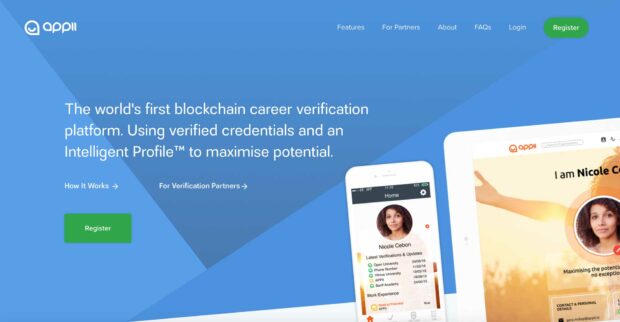
APPII leverages the blockchain to give employers confidence that the candidate they are considering is exactly who they say they are. APPII‘s uses Intelligent Profiles where verified details of professional achievement, employment history, and education can be permanently recorded in a distributed blockchain ledger.
News & Media
03) Trusted News Sources
Since the 2016 presidential elections in the United States, Fake News and disinformation has been a major problem. According to Pew Research, 62% of adults get news from their social media feeds. However, platforms like Google, Twitter, and Facebook, struggle to filter out content from untrusted sources. Why? It’s too much information and too manual of a process. However, the blockchain could be the cure to Fake News that everyone is looking for. News stories logged in a blockchain can prove legitimacy and help both aggregators and social networks filter and block content from appearing on their sites.
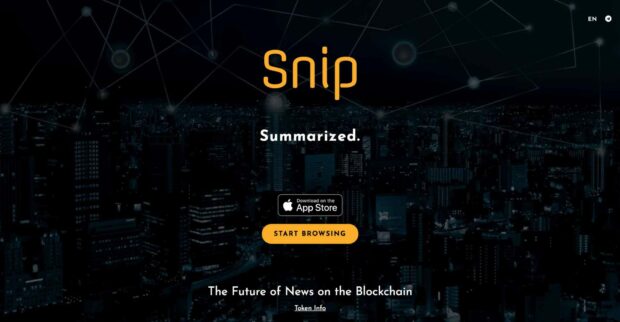
A company called Snip has a potential solution to the Fake News problem. Their proprietary cryptocurrency called SnipCoin is built on top of the Ethereum blockchain. Unlike Facebook, Snip’s platform uses open-source algorithms. Snip‘s goal is to deliver real news snippets. In contrast, Facebook’s algorithms are secret and designed to expose you to more paid content and ads.
04) Digital Rights Management
Are content creators like photographers and musicians getting fully compensated for their work? Probably not. But thanks to blockchain technology, those days might be over. Kodak’s new platform, KodakOne, enables photographers to publicly register their digital photography rights on the blockchain.

“KodakOne provides continual Web crawling in order to protect the IP of its members,” the KodakOne website says. “Where unlicensed usage of images is detected, KodakOne can efficiently manage the post-licensing process.” Content owners would then be paid via Kodak’s cryptocurrency called KodakCoin.
Government
05) Electronic Voting
It’s hard to believe, but back in 2000, a U.S. presidential election was decided by counting hanging chads from paper ballots. Technology has advanced incredibly since then and a pivot to a fully electronic voting system in the United States is inevitable. Some countries like Estonia, have already been voting electronically for years. But how can we prevent digital voting fraud and election hacking?
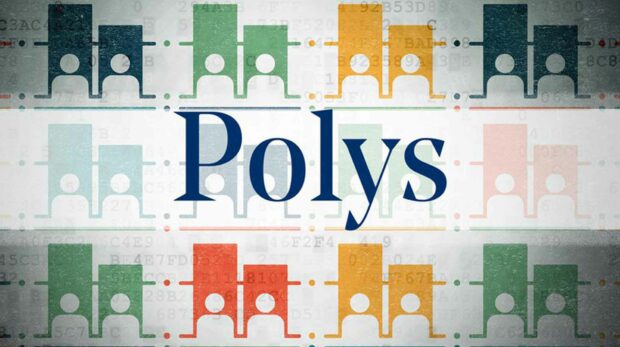
In November 2017, cybersecurity company Kaspersky Lab announced a secure digital voting system called Polys based on the Ethereum blockchain. “We believe that the blockchain technology is the missing link in the architecture of a viable online voting system,” notes the Polys website. Blockchain technology has the ability to track votes like transactions. This will help make sure voters are both real and legally allowed to vote.
A secure and trusted electronic voting system won’t just prevent voting fraud, but it will increase voter participation. Millions of people don’t vote in elections because they physically can’t get to the polls. An electronic voting system would completely change election dynamics and campaigning. Anyone who knows how to use a smartphone could vote in future elections from the convenience of their own homes.
06) Incorporation Services
Most US companies incorporate in the state of Delaware because of tax savings and access to legal expertise. This includes over half of all publicly traded companies and 65% of the Fortune 500.
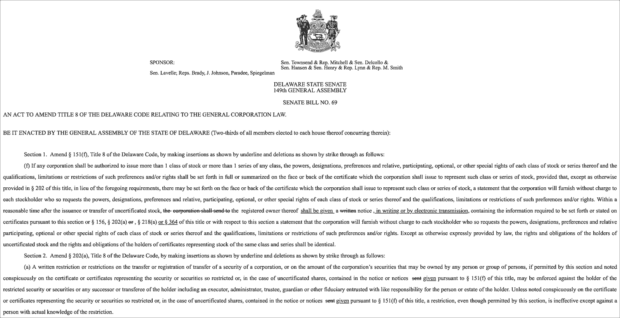
In an effort increase the efficiency of their incorporation services, the state announced the Delaware Blockchain Initiative in 2016. The state passed the bill, called Delaware Senate Bill 69, in June 2017. Faster and more reliable services will result is more business and revenue opportunities for the state.
Money & Business
07) Legal Contracts
Blockchain tencnology may also drive the next wave of innovation in the legal industry. The blockchain has the potential to store contracts and legal documents in shared databases that protect them from tampering and deletion.

Legal groups like the Global Legal Blockchain Consortium are already helping drive the adoption and standardization of blockchain technology in the legal industry.
Healthcare
08) Drug Traceability
There’s a lot of money in the counterfeit drug business. According to industry experts, the black market drug trade is estimated to be worth over $200 billion dollars annually. What’s worse, 10% of the pharmaceuticals in the global supply chain are believed to be counterfeit. And you don’t have to go down a dark alley to find these drugs. Hospitals and pharmacies unknowingly distribute counterfeit drugs to their patients every day.
But initiatives like the MediLedger Project, have been testing opportunities for blockchain technology in the pharmaceutical industry. Blockchains can help trace and verify a medicine’s journey from drug manufacturers to wholesalers, pharmacists, and ultimately to the patients.
09) Patient Records
The medical records infrastructure in the United States is in a state of total disaster. A single US city will often times have dozens of record systems with critical information scattered between them. But a medial blockchain could solve this problem.

However, instead of Bitcoin payments, a medical blockchain could record changes to a patient’s record. This file would be compatible with all blockchain enabled medical facilities around the world. Researchers at the MIT Media Lab have already created a prototype called MedRec based on the distributed public blockchain network Ethereum.
Logistics
10) Food Supply Chain
Because of the permanent and inalterable records of blockchain technology, it has already been adopted in the food supply chain industry. Walmart, for example, is using IBM’s blockchain platform to track meat sales in China. The blockchain tracks where the meat originated, how it was processed and stored, its sell date and final retail distribution. In the event of a recall, Walmart knows exactly what product was impacted, where it was sold and what needs to be recalled. Using blockchain technology in the food industry will almost certainly save lives. Globally, over 400,000 people die every year from contaminated food.
What Else Can The Blockchain Do?
The applications for blockchain technology is almost limitless. Any industry or organization that needs to log compatible and tamper-proof transactions transaction can benefit from the blockchain. If you have suggestions for additions or edits to this article, then please leave a note in the comments.

Frank Wilson is a retired teacher with over 30 years of combined experience in the education, small business technology, and real estate business. He now blogs as a hobby and spends most days tinkering with old computers. Wilson is passionate about tech, enjoys fishing, and loves drinking beer.

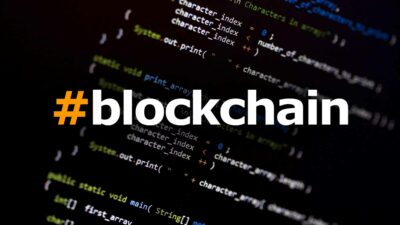










 50+ Famous Happy Birthday Quotes From Celebrities And Notable Personalities
50+ Famous Happy Birthday Quotes From Celebrities And Notable Personalities
bitcoin sucks. i lost $10k on that crap. total scam.